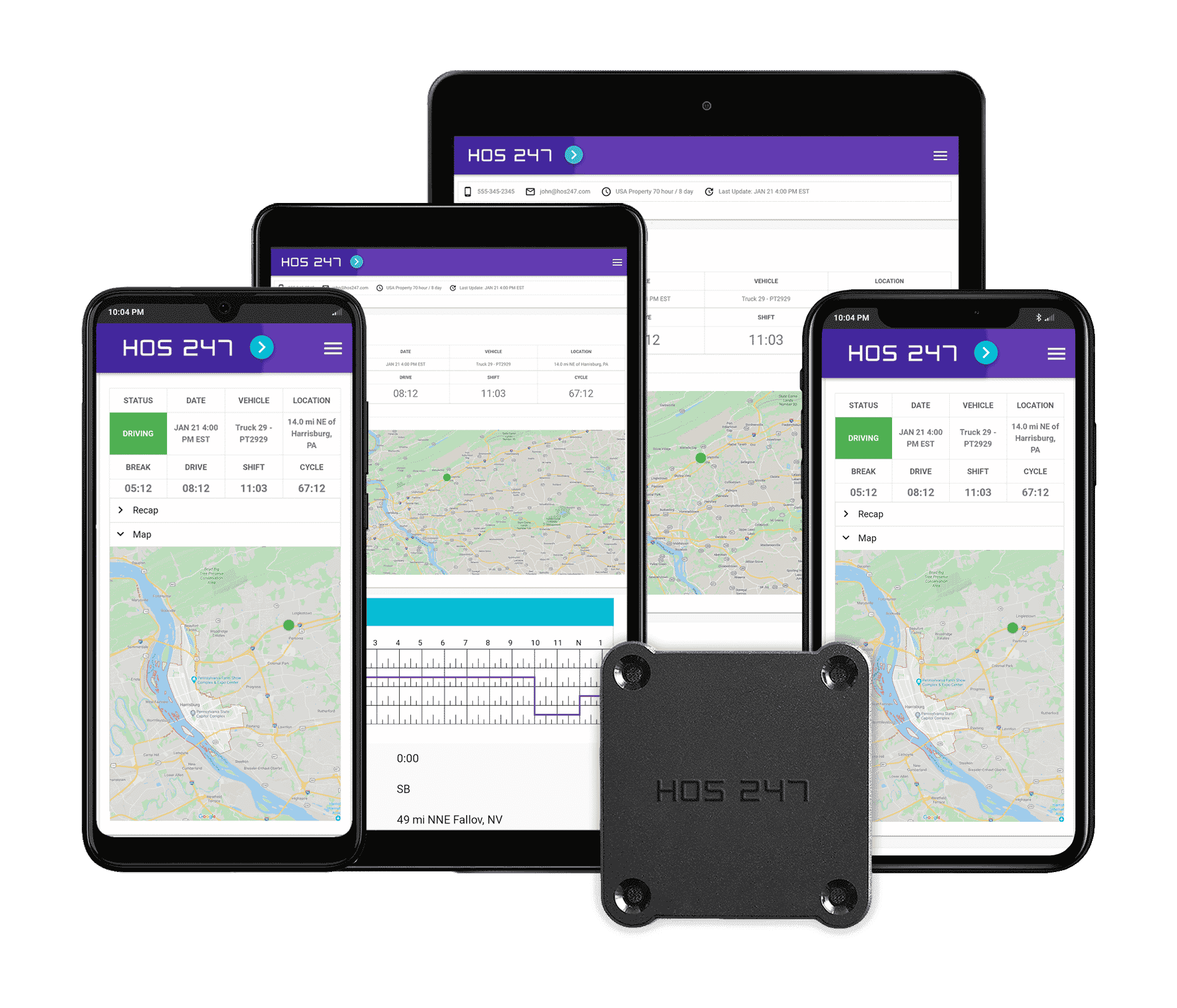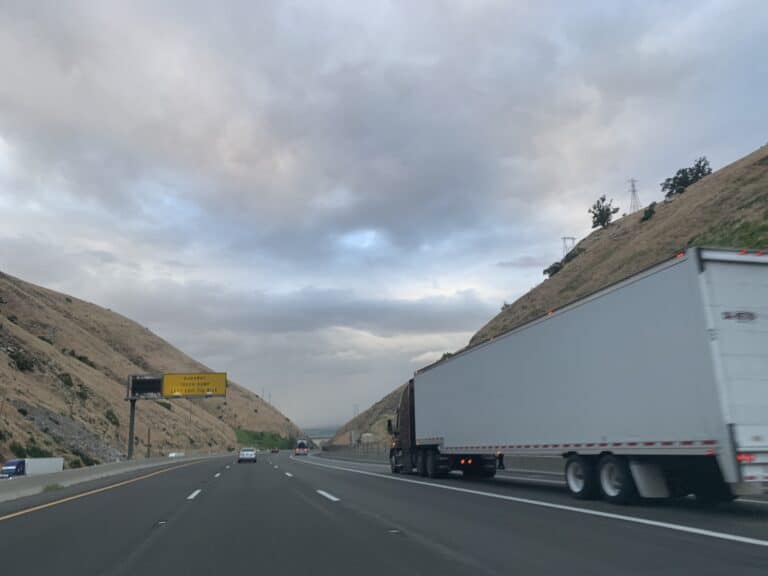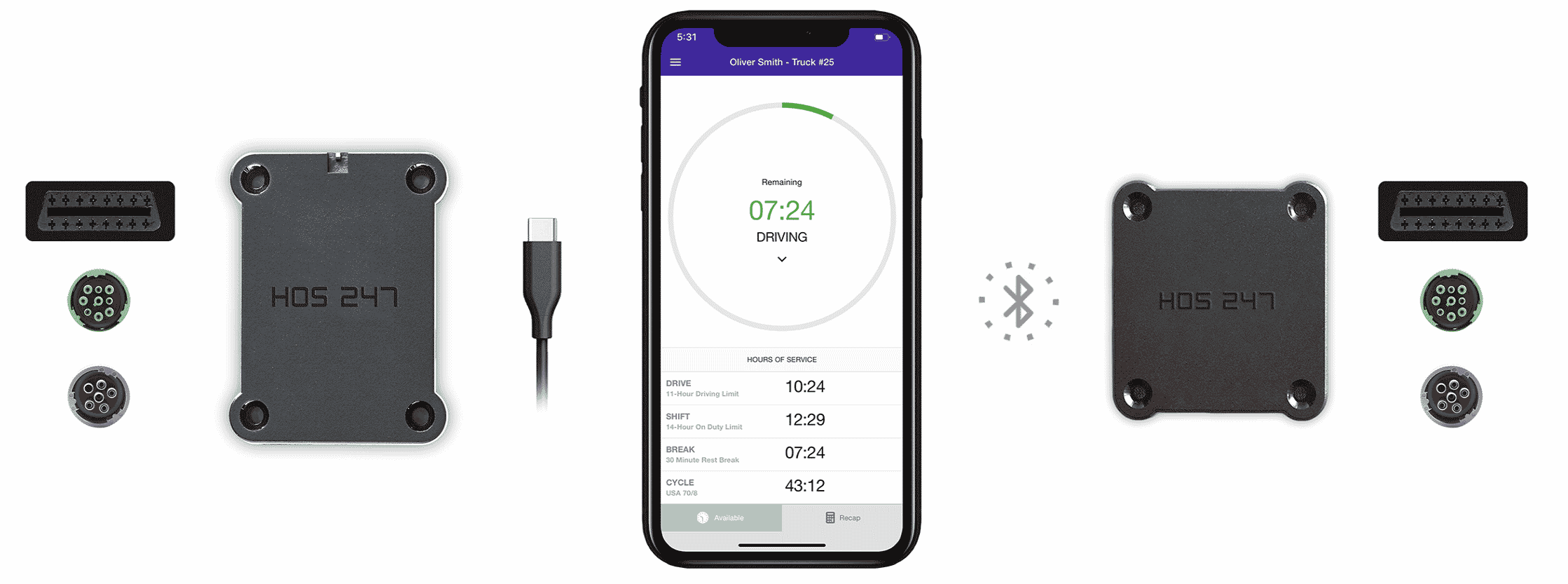Electronic logging devices (ELD) have changed the trucking industry with the implementation of the mandate in 2017. These digital records replaced traditional paper logbooks, revolutionizing how commercial motor vehicle drivers track their hours of service (HOS) and comply with federal regulations. Since the full implementation of e logs in December 2019, they have become standard practice for most commercial truckers in the United States.
Today, the focus for truckers and fleet managers is not just on staying compliant, but on choosing the best e logs for truckers to enhance productivity and increase profits. As the industry continues to evolve, e logs remain a critical tool for ensuring compliance, safety, and efficiency in trucking operations.
Do you have any questions? Talk to ELD Advisor: 650-405-3372 or Request Callback
Who Must Comply with the ELD Mandate?
The electronic logbook for truckers must be used for drivers who are required to keep up with their records of duty status (RODS). The primary criteria for keeping RODS includes:
- Participating in interstate commerce.
- Driving a vehicle that weighs 10,001 pounds or more.
- Driving a vehicle designed to transport nine or more passengers for a fee.
- Driving a vehicle designed to transport 16 passengers or more for free.
- Transporting a load that contains hazardous materials and required placards.
If any of these criteria apply, then you must comply with the electronic logbook requirement. It is best to find a solution that allows you to keep up not only with your e log but also has features to keep the operations running smoothly. There are also a few exceptions to those who must keep e logs. We will discuss those exemptions along with HOS exceptions later in this article.
ELD Exemptions and HOS Exceptions: What Truckers Need to Know
Electronic logging devices are mandatory for most commercial motor vehicle operators, but there are some exemptions to this rule. Additionally, there are exceptions to the HOS rules that ELDs must be able to accommodate. Let’s clarify these important distinctions:
ELD Exemptions
Some drivers are exempt from using ELDs and may continue using paper logs or other recording methods. These exemptions include:
- Drivers who use paper logs for not more than 8 days during any 30-day period.
- Drivers of vehicles manufactured before model year 2000.
- Drivers who conduct drive-away-tow-away operations, where the vehicle being driven is the commodity being delivered.
- Short-haul drivers who qualify for the 150 air-mile radius provision and don’t need to keep RODS.
HOS Exceptions That ELDs Must Support
While not exemptions from using ELDs, these are exceptions to standard HOS rules that compliant ELDs should be able to record:
- 30-minute break exception. Short-haul drivers operating within 150 air-miles of their work reporting location may be exempt from the 30-minute break rule.
- 16-hour short-haul exception. Once per 7-day period, a driver may extend their 14-hour driving window to 16 hours, provided they:
- Return to their work reporting location that day and for the past 5 duty tours.
- Are released from duty within 16 hours of coming on duty.
- Have not used this exception within the prior 6 days.
- Adverse driving conditions exception. Drivers may extend their maximum driving limit by up to 2 hours when encountering unexpected adverse driving conditions.
- Emergency exception. In declared emergency situations, drivers may complete their run without violating HOS regulations if they could have reasonably completed it absent the emergency.
Interstate and Intrastate Rules
The number of hours truckers can drive depends on whether they’re operating interstate (between states) or intrastate (within a single state). While federal HOS rules govern interstate commerce, individual states may have different rules for intrastate operations.
For example, Texas and California have their own intrastate HOS rules. It’s crucial to ensure your ELD can support both interstate and intrastate rules applicable to your operations.
When choosing an ELD solution, make sure it can accommodate these exemptions and exceptions as needed for your specific operations. HOS247 offers a flexible system that can be configured to support various operational needs while maintaining compliance with FMCSA regulations.
Remember, while these exceptions provide some flexibility, they should be used judiciously and in strict adherence to the rules to ensure safety and compliance.
E Log Rules for Truckers: Staying Compliant and Avoiding Violations
Understanding and following e log rules for truckers is crucial for maintaining compliance and avoiding costly violations. Here are some key rules to keep in mind:
- Maintain an ELD. Most commercial motor vehicle operators are required to use an FMCSA-registered and certified ELD.
- Adhere to HOS limits. E logs help track hours of service, but it’s the driver’s responsibility to stay within the legal limits.
- Keep supporting documents. Drivers must keep supporting documents (such as bills of lading, dispatch records, etc.) for at least eight days.
- Transfer data. Drivers must be able to transfer ELD data to authorized safety officials upon request.
- Know your exemptions. Understand if any HOS exemptions apply to your operation and use them correctly.
- Maintain a backup. In case of ELD malfunction, drivers should be prepared to log their hours manually and report the issue to their carrier.
- Understand personal conveyance. If using personal conveyance, ensure it’s used correctly to avoid compliance issues.
By following these rules and using a reliable ELD system like HOS247, truckers can ensure they stay compliant with FMCSA regulations and avoid potential violations.
How to Use E Logs for Truckers Effectively
To maximize the benefits of e logs for truckers, it’s crucial to understand how to use them effectively. Here are some tips for getting the most out of your electronic logging device:
- Familiarize yourself with the device. Take the time to learn all the features and functions of your specific ELD. Many providers, including HOS247, offer training and support to help drivers get up to speed quickly.
- Ensure accurate login and logout. Always log in at the beginning of your shift and log out at the end. This ensures that your hours of service are accurately recorded.
- Use personal conveyance correctly. If your ELD supports personal conveyance, make sure you understand when and how to use this feature to avoid compliance issues.
- Regularly review your logs. Take time to review your electronic logs regularly to ensure accuracy and identify any potential issues before they become problems.
- Utilize additional features. Take advantage of features like GPS tracking and IFTA reporting to streamline your operations and increase efficiency.
- Keep supporting documents. While e logs automate much of the record-keeping process, it’s still important to maintain supporting documents as required by the FMCSA.
- Communicate with your fleet manager. Use the communication features of your ELD to stay in touch with your fleet manager and resolve any issues quickly.
The Benefits of Using the Best E Logs for Truckers
Implementing the right electronic logbook can bring numerous benefits to both drivers and fleet managers:
- Improved compliance. E logs help ensure compliance with hours of service regulations, reducing the risk of violations and fines.
- Increased productivity. By automating record-keeping tasks, e logs free up drivers to focus on driving, potentially increasing their productive hours.
- Enhanced safety. E logs help prevent driver fatigue by ensuring compliance with mandatory rest periods, contributing to improved road safety.
- Simplified inspections. During roadside inspections, e logs can be quickly and easily shared with law enforcement, streamlining the process.
- Real-time visibility. Fleet managers can access real-time data on driver hours, helping to optimize scheduling and prevent HOS violations.
- Reduced paperwork. E logs eliminate the need for paper logbooks, reducing administrative burden and the potential for human error.
- Cost savings. While there is an initial investment in ELD technology, the long-term benefits often result in cost savings through improved efficiency and reduced violations.

Why Switch to a Better Electronic Logging System
As the ELD mandate has been in effect for several years now, many trucking companies and independent operators have gained experience with various electronic logging systems. However, not all electronic logbooks are the same, and you may find that your current system isn’t meeting your needs as effectively as it could. Here’s why you might consider upgrading:
- Improved reliability. Some early ELD adopters may have experienced issues with system downtime or inaccurate logging. Modern, robust systems offer enhanced reliability.
- User-friendly interface. If drivers are struggling with a complicated interface, it may be time for a more intuitive solution that can save time and reduce errors.
- Better customer support. Responsive, knowledgeable customer support can make a significant difference in resolving issues quickly and minimizing disruptions.
- Enhanced features. Newer ELD solutions often come with additional features like improved GPS tracking, more detailed reporting, or better integration with other fleet management tools.
- Cost-effectiveness. While the initial switch to ELDs may have been costly, the market has matured, and more cost-effective solutions are now available.
How to Find the Right Elog for Your Trucking Business
Choosing the right electronic logging system is crucial for your trucking operation’s efficiency and compliance. Here’s how to find the electronic logbook for your specific business needs:
- Assess your operation. Consider your fleet size, types of vehicles, and specific regulatory requirements you need to meet.
- Check for FMCSA compliance. Ensure the ELD is registered with and compliant with FMCSA regulations.
- Consider ease of use. The best e logs for truckers are intuitive and easy for drivers to operate, minimizing training time and reducing errors.
- Review customer support. Look for providers offering robust, multilingual customer support to assist with any issues that may arise.
- Examine pricing structure. Consider both upfront costs and ongoing fees. Be wary of hidden charges for essential services.
- Read user reviews. Look for feedback from other truckers and fleet managers to gauge real-world performance and reliability.
- Evaluate features. Look for essential features like GPS tracking, IFTA mileage reporting, and user-friendly interfaces. Determine which additional features could benefit your operation.
- Consider scalability. Choose a solution that can grow with your business and adapt to changing regulations.
- Evaluate data accessibility. Ensure the system provides easy access to logs and reports for both drivers and fleet managers.
- Test before committing. If possible, take advantage of free trials or money-back guarantee periods to ensure the system works well for your needs.
HOS247 offers a comprehensive, user-friendly e log solution that addresses many of the common pain points experienced with other systems. With transparent pricing, no long-term contracts, and a two-week return policy, we’re confident in our ability to meet your electronic logging needs.
Upgrading your e log solution can lead to improved efficiency, better compliance, and reduced frustration for both drivers and fleet managers. By carefully considering your options and choosing a reliable provider, you can ensure that your ELD system is an asset to your operation rather than a hindrance.
Do you have any questions? Talk to ELD Advisor: 650-405-3372 or Request Callback
HOS247 Electronic Logbook’s Benefits
HOS247 stands out as a leading provider of electronic logbooks, offering a reliable solution that goes beyond basic compliance. Here are some key benefits of choosing HOS247:
- User-friendly interface. Our easy-to-use system minimizes the learning curve for drivers and fleet managers alike.
- Top-rated customer support. Our multilingual team offers assistance every day of the week. We work hard to resolve any issues as promptly as possible.
- Durable hardware. Our devices are dependable and high quality to provide a stable Bluetooth connection and data transfer.
- No long-term contracts. We offer flexible terms without locking you into lengthy service periods.
- Hassle-free returns. We provide a two-week return policy, demonstrating our confidence in our product’s quality.
- Regular updates. We continuously update our system to ensure compliance with regulations.
- Transparent pricing. No hidden fees for essential services like installation, dedicated tablets, or training.
- Fleet management integrations:
- GPS fleet tracking. Our system allows real-time tracking of your fleet, improving efficiency and decision-making.
- IFTA mileage calculations. Automatically calculate distance traveled in each state, simplifying tax reporting.
- Predictive maintenance. Receive alerts when your vehicles need tire rotations, oil changes, etc.
By offering these features and benefits, HOS247 provides a comprehensive e log solution to help truckers improve compliance, boost efficiency, and streamline operations. Whether you’re an independent owner-operator or managing a large fleet, HOS247’s electronic logbook system is designed to meet your specific needs and keep your business running smoothly.
Conclusion
The landscape of trucking has transformed significantly with the widespread adoption of electronic logging devices. What once began as a regulatory requirement answering the question “what is e-log for truckers?” has evolved into an essential tool for fleet management and operational efficiency. Today’s e-logging solutions offer far more than just hours-of-service compliance.
Choosing the correct e-log for truckers is crucial for maximizing the benefits. HOS247 stands out as a leading provider, offering a user-friendly interface, robust features, and exceptional customer support. With additional services like GPS tracking, IFTA reporting, and dispatch, HOS247 provides a comprehensive solution for modern trucking operations.
As the industry continues to evolve, staying informed about e log rules for truckers and best practices for using these devices will be essential. By embracing this technology and choosing a reliable provider like HOS247, truckers and fleet managers can ensure they’re well-equipped to meet the challenges of today’s trucking industry while preparing for the innovations of tomorrow.
Remember, compliance with ELD regulations is not just about avoiding violations – it’s about promoting safety, efficiency, and professionalism in the trucking industry. With the right e log solution, truckers can focus on what they do best: keeping America’s goods moving safely and efficiently across the nation’s highways.

I’ve co-founded, built and managed several transportation-related businesses. Now, I’m a founder and CEO of HOS247 – an AI Transportation Platform for trucking companies, freight brokers and other logistics operations. We are transitioning old-style operations to technology-advanced logistics entities and help them to grow their businesses. ELDs (electronic logging devices), fleet tracking and management 2.0 combined with AI-powered dispatch tools.












According to the ELD mandate, published by the FMCSA and enforced by the DOT, commercial vehicle drivers must use approved electronic logging devices instead of paper logs to keep records of duty status since December 16, 2019. This includes commercial

The trucking industry is undergoing a significant transformation, driven by the need for increased efficiency, safety, and compliance. As the landscape of fleet management evolves, it is crucial for trucking companies to adopt innovative solutions to stay competitive in a

Professional truck drivers depend on reliable electronic logging technology to maintain compliance while managing their daily operations efficiently. While the ELD mandate changed how hours of service are tracked, the quality and reliability of these devices vary significantly across the
